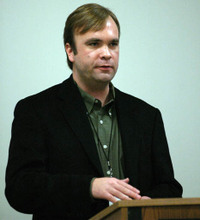
Atrios (alias Duncan Black, left), and other liberal bloggers, continue to blame the lack of media concern over their point of view to conspiracies, intimidation, or personal distaste by the Washington "Village" elite.
It is none of these things.
It is, as I’ve written here many times, the natural result of an entrenched political thesis meeting a new thesis for which is is unprepared.
Players of The 1967 Game will see this clearly. As a political thesis, a set of myths and values, assumptions and beliefs, is validated by history, everyone in the media comes to accept it, often unconsciously, as the only way to interpret the world. This is true whether they are considered left, right or center, whether they are engaged in fact-finding or opinion-mongering. Expecting different is to expect a fish to have the point of view of a bird.
This was very much true in 1967. Conservatives like James J. Kilpatrick and William F. Buckley were essentially marginalized in 1967, treated exactly as the Netroots have been the last several years despite the growing electoral success of their ideas, as in Ronald Reagan’s first victory in California. It is true that the Netroots have had more electoral success than the New Right had at that time — Congress in 1967 was still controlled by Democrats, the previous general election had been a blow-out against them rather than a narrow loss.
The financial resources of the New Right were also far more substantial than those of today’s Netroots, so their institutional base was broader. But not much. The Heritage Foundation, considered the first and most important New Right think tank, was not created until 1973. The New Right in 1967 was, relatively speaking, a cottage industry, with little-read magazines like National Review, underground newsletters and direct-mail pieces like those of Richard Viguerie, and little-noticed youth groups like Young Americans for Freedom like guppies in an ocean of sharks.
What has happened, in fact, is that the 1968 election set off a generation-long chain of events in which new assumptions were built, then trumpeted, then struggled and triumphed, and were eventually validated. This process was fairly complete by 1988, just as the process of the New Deal’s Thesis-creation was complete by 1948. Truman and George H.W. Bush stood at the same point on American history’s wheel.
The best authority on this is Richard M. Nixon himself. Nixon felt
continually persecuted by the liberal media, by the liberal
establishment, even by the liberal moneymen of his time, the kind of
people who hung out at the Business Roundtable. He felt abused during the 1960 election, felt he hadn’t been given a real shot by "the establishment." Even though he had spent years leaning against this New Deal Thesis, building a solid Anti-Thesis to it.
In 1960, Richard M. Nixon had been Vice President for 8 years. He
had presided, with Dwight Eisenhower, over a period of relative peace
and prosperity. Yet this relative pipsqueak, with his daddy’s money,
had beaten him. How? Why? (And does this story sound familiar?)
Nixon’s answers to these questions were no different, and no better,
than those Atrios and Digby offer now. In Nixon’s case they fed a
paranoid world view, one he shared with the growing New Right movement
throughout the decade. Once he gained office this paranoia gained full
voice, first through the speeches of Spiro Agnew (ghost-written by
William Safire), then in the horrors of the plumbers and Watergate
which were, in their way, trial runs for the Bush Years to follow.
My reason for going back over this history is to point out how
taking history personally can poison men, and women, can poison
movements, and can set in motion a long series of events that will
leave both your children and the movement, in time, discredited,
destroyed, and destructive of all its original aims.
So learn from history. Don’t take its patterns personally. Taking history personally is the best way to repeat its patterns, and turn yourself into what you most
fear.












Um… what? I don’t hear Digby or Duncan complain that they’ve personally been marginalized. They rail about the punditry that has been co-opted by media consolidation, that carries forth a pro-corporate class viewpoint, neither hewing to traditional liberal nor conservative constructs.
Occasionally, it’ll be pointed out that corporatocracy victimizes Dems, especially, which seems understandable because that party has historically been more populist..
Or maybe you’re saying that the liberal bloggers are breaking down what’s going on and presenting it to their audiences at a level of how the media is impacting them personally, which can provoke an emotional response. If so, I still don’t get what your point is. Are you saying liberals will become paranoid, wiretap their opponents, plumber their hotel rooms and move on to Constitutional and international law usurpations eventually?
I’m certainly an advocate of knowing history to avoid repeating its worst, but I fail to see the evidence that the bigger names in the liberal blogosphere have made that error just because they point out evident media bias.
Would you clarify please?
Um… what? I don’t hear Digby or Duncan complain that they’ve personally been marginalized. They rail about the punditry that has been co-opted by media consolidation, that carries forth a pro-corporate class viewpoint, neither hewing to traditional liberal nor conservative constructs.
Occasionally, it’ll be pointed out that corporatocracy victimizes Dems, especially, which seems understandable because that party has historically been more populist..
Or maybe you’re saying that the liberal bloggers are breaking down what’s going on and presenting it to their audiences at a level of how the media is impacting them personally, which can provoke an emotional response. If so, I still don’t get what your point is. Are you saying liberals will become paranoid, wiretap their opponents, plumber their hotel rooms and move on to Constitutional and international law usurpations eventually?
I’m certainly an advocate of knowing history to avoid repeating its worst, but I fail to see the evidence that the bigger names in the liberal blogosphere have made that error just because they point out evident media bias.
Would you clarify please?
I agree with above, your “analysis” makes little sense. Are you saying politics goes in cycles and that we simply have to wait? That’s ridiculous. How are Digby and Atrios poisoning anything? Not that I am a huge fan of their overly simplistic worldview, but you present no alternative worldview. In any case, in 1967 the country was clearly liberal and the media reflected that more, but now the media establishment is conservative even though it is not clear the country is more conservative. WHY???
I agree with above, your “analysis” makes little sense. Are you saying politics goes in cycles and that we simply have to wait? That’s ridiculous. How are Digby and Atrios poisoning anything? Not that I am a huge fan of their overly simplistic worldview, but you present no alternative worldview. In any case, in 1967 the country was clearly liberal and the media reflected that more, but now the media establishment is conservative even though it is not clear the country is more conservative. WHY???